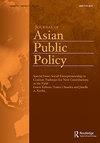The bedrock of public service motivation among Chinese adolescents: family and school institutions
IF 1.5
3区 社会学
Q1 AREA STUDIES
引用次数: 3
Abstract
ABSTRACT This study investigates the individual and interaction effects of parents and teachers on shaping adolescents’ PSM. Based on nationally representative data from China, we find that both family- and classroom- level factors positively impact adolescents’ PSM. Results further show that a satisfying teacher-student relationship significantly attenuates the influence the parent-child relationship imposes on PSM. This study empirically proves that the development of PSM can be understood as other-oriented emotional responses generated during one’s exchanges with socialization agents, leaving fertile ground for inquiries into non-organizational antecedents of PSM and the design of policies to foster it at the pre-entry stage.中国青少年公共服务动机的基础:家庭和学校机构
摘要本研究探讨了家长和教师对青少年PSM形成的个体效应和互动效应。基于具有全国代表性的数据,我们发现家庭和课堂层面的因素都对青少年的PSM有正向影响。结果进一步表明,满意的师生关系显著减弱了亲子关系对PSM的影响。本研究实证证明,PSM的发展可以被理解为一个人在与社会化代理人交流过程中产生的他者导向的情绪反应,这为探究PSM的非组织前因以及在进入前阶段促进PSM的政策设计留下了肥沃的土壤。
本文章由计算机程序翻译,如有差异,请以英文原文为准。
求助全文
约1分钟内获得全文
求助全文

 求助内容:
求助内容: 应助结果提醒方式:
应助结果提醒方式:


